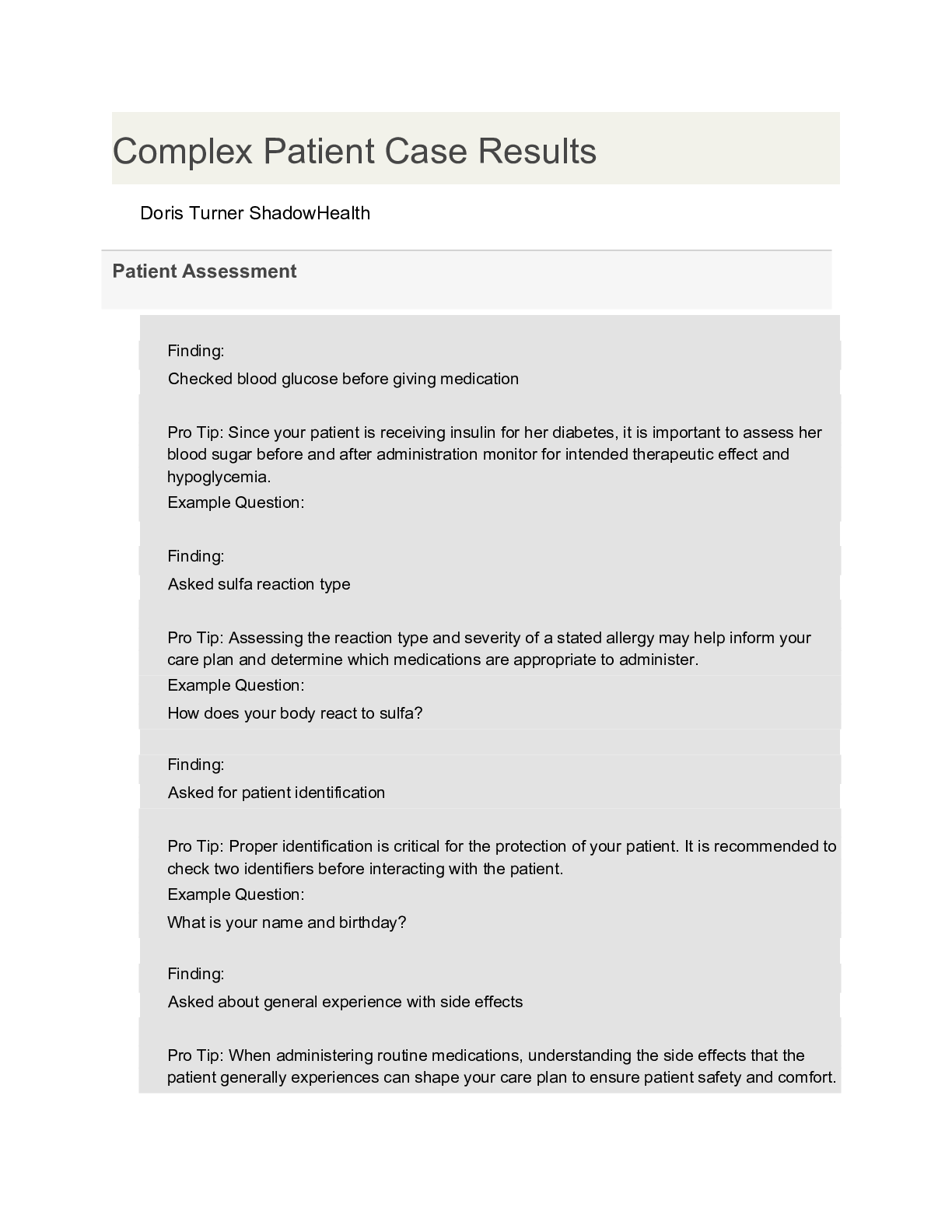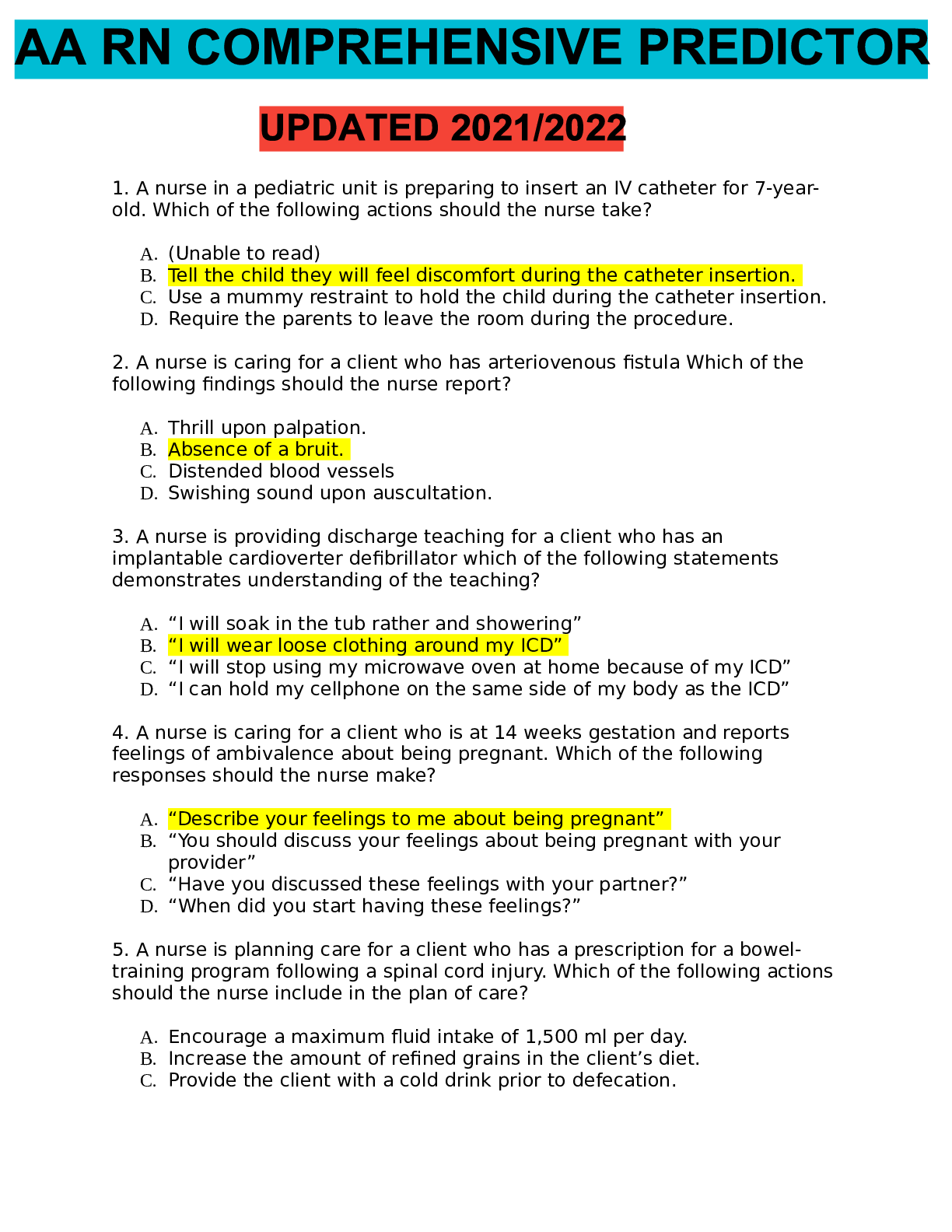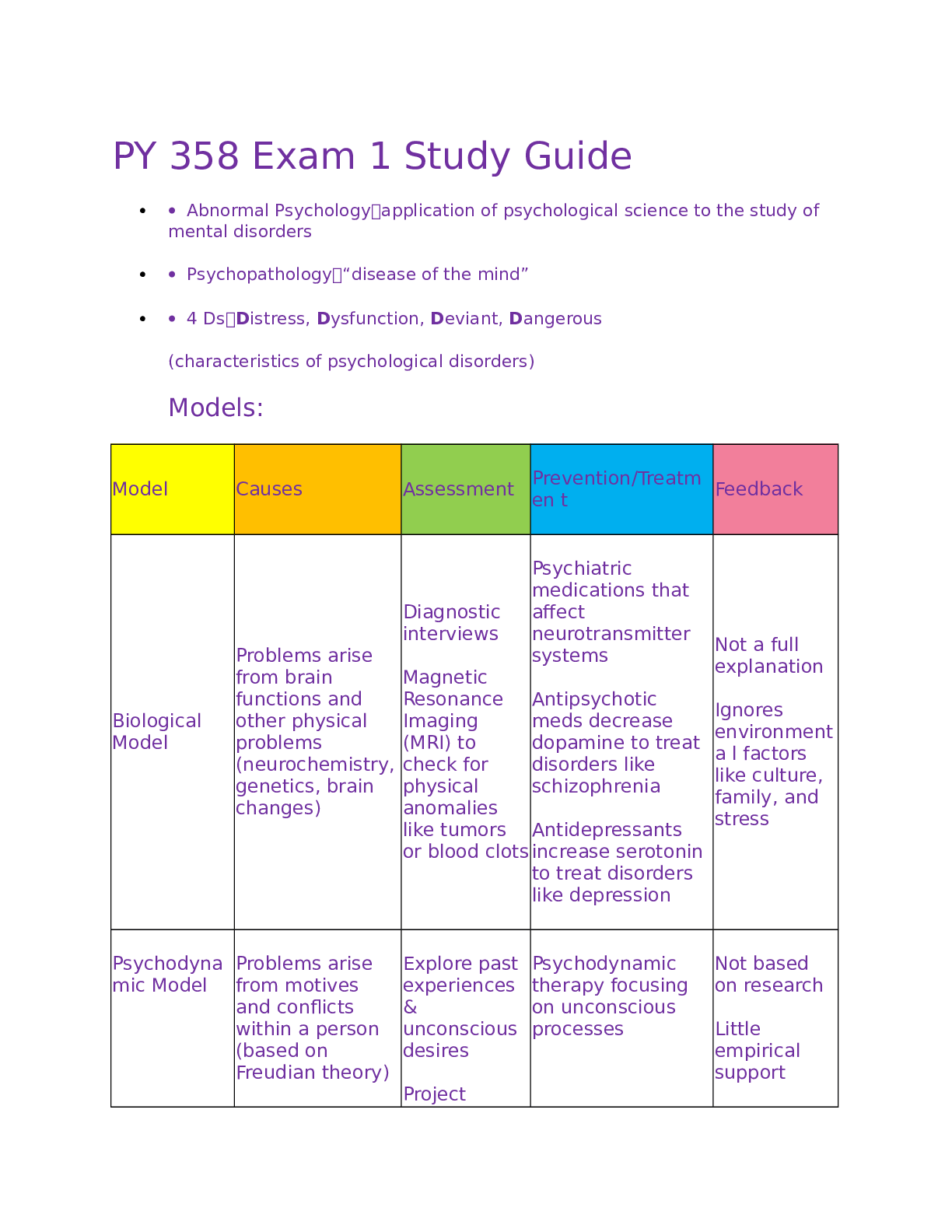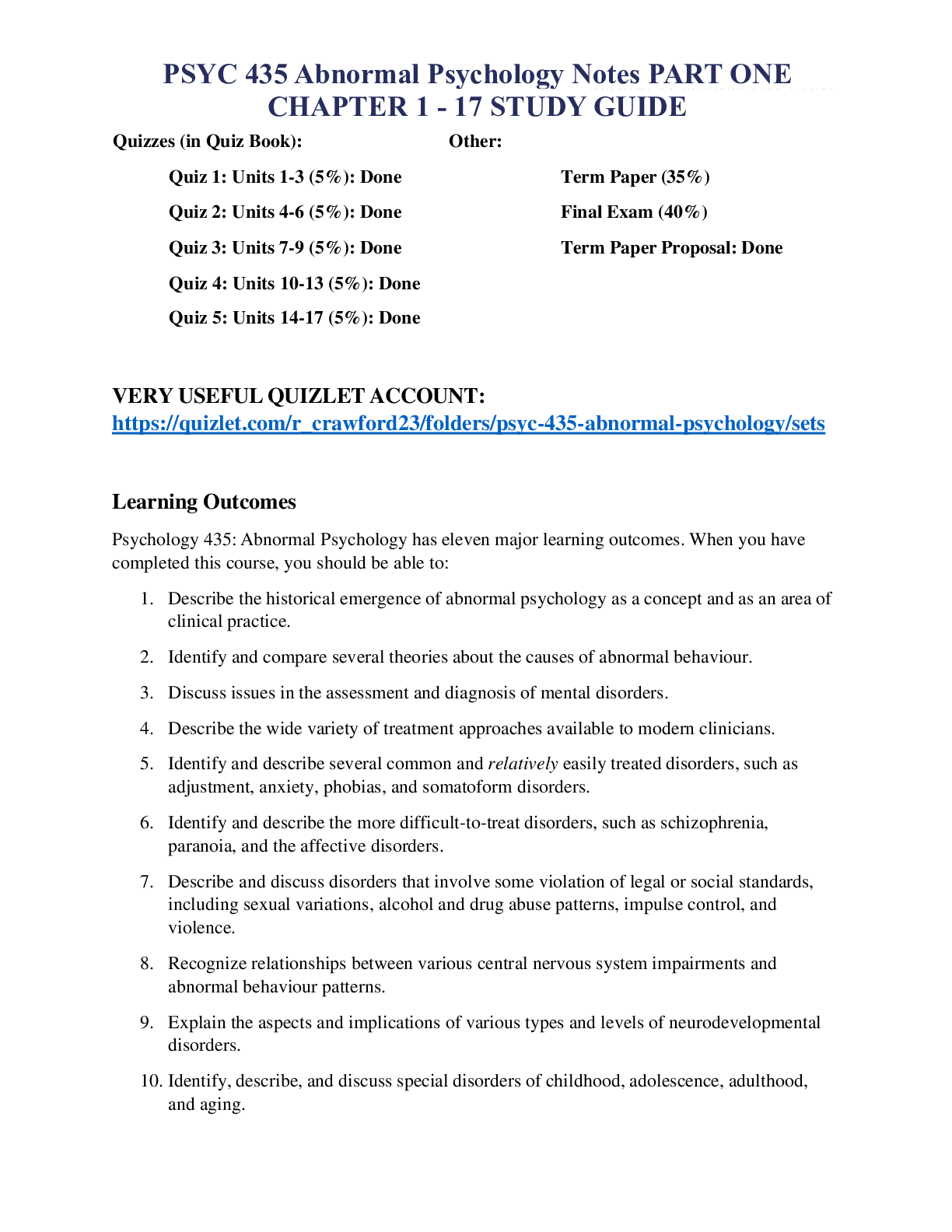*NURSING > STUDY GUIDE > NR 508 Advanced Pharmacology Mid-Term Exam.docx 97% Complete (All)
NR 508 Advanced Pharmacology Mid-Term Exam.docx 97% Complete
Document Content and Description Below
NR 508 Advanced Pharmacology Mid-Term E 1. A patient asks a primary care NP whether over-the-counter drugs are safer than prescription drugs. The NP should explain that over-the-counter drugs are: (Po... ints : 2) Question 2.2. A woman who is being treated with radiotherapy for breast cancer asks her primary care nurse practitioner (NP) about using dietary supplements to improve her chance of recovery. The NP should tell her that: (Points : 2) Question 3.3. A patient with type 2 diabetes mellitus takes metformin (Glucophage) 1000 mg twice daily and glyburide (Micronase) 12 mg daily. At an annual physical examination, the BMI is 29 and hemoglobin A1c is 7.3%. The NP should: (Points : 2) Question 4.4. A patient comes to the clinic to discuss weight loss. The primary care NP notes a BMI of 32 and performs a health risk assessment that reveals no obesity-related risk factors. The NP should recommend: (Points : 2) Question 5.5. Which of the following statements is true about the prescribing practices of physicians? (Points : 2) Question 6.6. A primary care NP is aware that many patients in the community use herbal remedies to treat various conditions. The NP understands the importance of: (Points : 2) Question 7.7. A patient who is at risk for DVT tells the primary care NP she has just learned she is pregnant. The NP should expect that this patient will use which of the following anticoagulant medications? (Points : 2) Question 8.8. As primary care nurse practitioners (NPs) continue to develop their role as prescribers of medications, it will be important to: (Points : 2) Question 9.9. A patient with a previous history of myocardial infarction (MI) who takes nitroglycerin for angina develops hypertension. The primary care NP is considering ordering an ACE inhibitor. Preliminary laboratory tests reveal decreased renal function. The NP should: (Points : 2) Question 10.10. A 40-year-old woman tells the primary care nurse practitioner (NP) that she does not want more children and would like a contraceptive. She does not smoke and has no personal or family history of cardiovascular disease. She has frequent tension headaches. For this patient, the NP should prescribe: (Points : 2) Question 11.11. A postmenopausal woman develops NSAID-induced ulcer. The primary care NP should prescribe: (Points : 2) Question 12.12. A 52-year-old woman reports having hot flashes and intense mood swings. After a year of having irregular menstrual periods, she has not had a period for 6 months. The primary care NP should diagnose: (Points : 2) Question 13.13. An important difference between physician assistants (PAs) and NPs is PAs: (Points : 2) Question 14.14. An 80-year-old patient has begun taking propranolol (Inderal) and reports feeling tired all of the time. The primary care NP should: (Points : 2) Question 15.15. The primary care NP is preparing to prescribe a diuretic for a patient who has heart failure. The patient reports having had an allergic reaction to sulfamethoxazole-trimethoprim (Bactrim) previously. The NP should prescribe: (Points : 2) Question 16.16. A patient who has diabetes mellitus and congestive heart failure takes insulin and warfarin. The patient will begin taking exogenous testosterone to treat secondary hypogonadism. The primary care NP should recommend: (Points : 2) Question 17.17. A patient who has insulin-dependent type 2 diabetes reports having difficulty keeping blood glucose within normal limits and has had multiple episodes of both hypoglycemia and hyperglycemia. As adjunct therapy to manage this problem, the primary care NP should prescribe: (Points : 2) Question 18.18. A patient who has IBS experiences diarrhea, bloating, and pain but does not want to take medication. The primary care NP should recommend: (Points : 2) 25 g of fiber each day. avoiding gluten and lactose in the diet. increasing water intake to eight to ten glasses per day. beginning aerobic exercise, such as running, every day. Question 19.19. A patient takes an antispasmodic and an occasional antidiarrheal medication to treat IBS. The patient comes to the clinic and reports having dry mouth, difficulty urinating, and more frequent constipation. The primary care NP notes a heart rate of 92 beats per minute. The NP should: (Points : 2) Question 20.20. A patient comes to the clinic with a 4-day history of 10 to 12 liquid stools each day. The patient reports seeing blood and mucus in the stools. The patient has had nausea but no vomiting. The primary care NP notes a temperature of 37.9° C, a heart rate of 96 beats per minute, and a blood pressure of 90/60 mm Hg. A physical examination reveals dry oral mucous membranes and capillary refill of 4 seconds. The NP’s priority should be to: (Points : 2) Question 21.21. A woman who uses a transdermal contraceptive calls the primary care NP to report that while dressing that morning she discovered that the patch had come off and she was unable to find the patch. The NP should tell her to apply a new patch and: (Points : 2) Question 22.22. A patient who has migraine headaches has begun taking timolol and 2 months after beginning this therapy reports no change in frequency of migraines. The patient’s current dose is 30 mg once daily. The primary care NP should: (Points : 2) Question 23.23. A patient with congestive heart failure will begin therapy with a diuretic medication. The primary care NP orders laboratory tests, which reveal a glomerular filtration rate (GFR) of 25 mL/minute. The initial drug the NP should prescribe is: (Points : 2) Question 24.24. A patient who has a history of angina has sublingual nitroglycerin tablets to use as needed. The primary care nurse practitioner (NP) reviews this medication with the patient at the patient’s annual physical examination. Which statement by the patient indicates understanding of the medication? (Points : 2) Question 25.25. The primary care nurse practitioner (NP) sees a patient in the clinic who has a blood pressure of 130/85 mm Hg. The patient’s laboratory tests reveal high-density lipoprotein, 35 mg/dL; triglycerides, 120 mg/dL; and fasting plasma glucose, 100 mg/dL. The NP calculates a body mass index of 29. The patient has a positive family history for cardiovascular disease. The NP should: (Points : 2) Question 26.26. A patient has been taking levothyroxine 100 mcg daily for several months. The patient comes to the clinic with complaints of insomnia and irritability. The primary care NP notes a heart rate of 92 beats per minute. The NP should: (Points : 2) Question 27.27. A primary care NP is preparing to prescribe a drug and notes that the drug has nonlinear kinetics. The NP should: (Points : 2) Question 28.28. The primary care nurse practitioner (NP) writes a prescription for an antibiotic using an electronic drug prescription system. The pharmacist will fill this prescription when: (Points : 2) Question 29.29. The primary care NP sees a new patient for a routine physical examination. When auscultating the heart, the NP notes a heart rate of 78 beats per minute with occasional extra beats followed by a pause. History reveals no past cardiovascular disease, but the patient reports occasional syncope and shortness of breath. The NP should: (Points : 2) Question 30.30. The primary care NP prescribes an extended-cycle monophasic pill regimen for a young woman who reports having multiple partners. Which statement by the patient indicates she understands the regimen? (Points : 2) Question 31.31. A patient who is taking trimethoprim-sulfamethoxazole for prophylaxis of urinary tract infections tells the primary care NP that a sibling recently died from a sudden cardiac arrest, determined to be from long QT syndrome. The NP should: (Points : 2) Question 32.32. A patient who has IBS has been taking dicyclomine and reports decreased pain and diarrhea but is now having occasional constipation. The primary care NP should recommend: (Points : 2) Question 33.33. The primary care NP sees a new patient who has diabetes and hypertension and has been taking a thiazide diuretic for 6 months. The patient’s blood pressure at the beginning of treatment was 150/95 mm Hg. The blood pressure today is 138/85 mm Hg. The NP should: (Points : 2) Question 34.34. A female patient who is underweight tells the primary care NP that she has been using bisacodyl (Dulcolax) daily for several years. The NP should: (Points : 2) Question 35.35. A parent calls a clinic for advice about giving an over-the-counter cough medicine to a 6-year-old child. The parent tells the NP that the medication label does not give instructions about how much to give a child. The NP should: (Points : 2) Question 36.36. A patient who has asthma and who is known to the primary care NP calls the NP after hours and asks for a refill of an albuterol metered-dose inhaler. The patient has not been seen in the clinic for more than a year. The NP should: (Points : 2) Question 37.37. A patient takes a cardiac medication that has a very narrow therapeutic range. The primary care NP learns that the particular brand the patient is taking is no longer covered by the patient’s medical plan. The NP knows that the bioavailability of the drug varies from brand to brand. The NP should: (Points : 2) Question 38.38. A 50-year-old woman who is postmenopausal is taking an aromatase inhibitor as part of a breast cancer treatment regimen. She calls her primary care NP to report that she has had hot flashes and increased vaginal discharge but no bleeding. The NP should: (Points : 2) Question 39.39. A patient has NSAID-induced ulcer and has started taking ranitidine (Zantac). At a follow-up appointment 3 days later, the patient reports no alleviation of symptoms. The primary care NP should: (Points : 2) Question 40.40. An 80-year-old patient who has persistent AF takes warfarin (Coumadin) for anticoagulation therapy. The patient has an INR of 3.5. The primary care NP should consider: (Points : 2) Question 41.41. A patient undergoes a routine electrocardiogram (ECG), which reveals occasional premature ventricular contractions that are present when the patient is resting and disappear with exercise. The patient has no previous history of cardiovascular disease, and the cardiovascular examination is normal. The primary care NP should: (Points : 2) Question 42.42. A patient who has an upper respiratory infection reports using over-the-counter cold preparations. The primary care NP should counsel this patient to use caution when taking additional over-the-counter medications such as: (Points : 2) Question 43.43. The primary care NP sees a new African-American patient who has blood pressure readings of 140/90 mm Hg, 130/85 mm Hg, and 142/80 mm Hg on three separate occasions. The NP learns that the patient has a family history of hypertension. The NP should: (Points : 2) Question 44.44. A patient has been using an herbal supplement for 2 years that the primary care NP knows may have toxic side effects. The NP should: (Points : 2) Question 45.45. A 45-year-old patient who has a positive family history but no personal history of coronary artery disease is seen by the primary care NP for a physical examination. The patient has a body mass index of 27 and a blood pressure of 130/78 mm Hg. Laboratory tests reveal low-density lipoprotein, 110 mg/dL; high-density lipoprotein, 70 mg/dL; and triglycerides, 120 mg/dL. The patient does not smoke but has a sedentary lifestyle. The NP should recommend: (Points : 2) Question 46.46. The primary care NP refers a patient to a cardiologist who diagnoses long QT syndrome. The cardiologist has prescribed propranolol (Inderal). The patient exercises regularly and is not obese. The patient asks the NP what else can be done to minimize risk of sudden cardiac arrest. The NP should counsel the patient to: (Points : 2) Question 47.47. A child who has congenital hypothyroidism takes levothyroxine 75 mcg/day. The child weighs 15 kg. The primary care NP sees the child for a 3-year-old check-up. The NP should consult with a pediatric endocrinologist to discuss: (Points : 2) Question 48.48. A 5-year-old child has chronic constipation. The primary care NP plans to prescribe a laxative for long-term management. In addition to pharmacologic therapy, the NP should also recommend _____ g of fiber per day. (Points : 2) Question 49.49. A patient who has angina is taking nitroglycerin and long-acting nifedipine. The primary care NP notes a persistent blood pressure of 90/60 mm Hg at several follow-up visits. The patient reports lightheadedness associated with standing up. The NP should consult with the patient’s cardiologist about changing the medication to: (Points : 2) Question 50.50. A patient reports taking antioxidant supplements to help prevent cancer. The primary care NP should: (Points : 2) Question 51.51. A primary care NP has prescribed phentermine for a patient who is obese. The patient loses 10 lb in the first month but reports that the drug does not seem to be suppressing appetite as much as before. The NP should: (Points : 2) Question 52.52. A patient is taking drug A and drug B. The primary care NP notes increased effects of drug B. The NP should suspect that in this case drug A is a cytochrome P450 (CYP450) enzyme: (Points : 2) Question 53.53. The primary care NP is prescribing a medication for an off-label use. To help prevent a medication error, the NP should: (Points : 2) Question 54.54. A patient who takes digoxin reports taking psyllium (Metamucil) three or four times each month for constipation. The primary care NP should counsel this patient to: (Points : 2) Question 55.55. A primary care NP prescribes a nitroglycerin transdermal patch, 0.4 mg/hour release, for a patient with chronic stable angina. The NP should teach the patient to: (Points : 2) Question 56.56. A primary care NP is prescribing a drug for a patient who does not take any other medications. The NP should realize that: (Points : 2) Question 57.57. A patient who takes nitroglycerin for stable angina pectoris develops hypertension. The primary care NP should contact the patient’s cardiologist to discuss adding: (Points : 2) amlodipine (Norvasc). diltiazem (Cardizem). verapamil HCl (Calan). nifedipine (Procardia XL). Question 58.58. A patient has recurrent symptoms and tells the primary care NP that she can’t remember to take her medication all the time. The NP should: (Points : 2) give her shortened regimens of the drug to facilitate compliance. provide written information about her condition and the medication. administer the medication in the clinic to ensure that she takes the drug. ask her about her lifestyle, her schedule, and her understanding of her condition. Question 59.59. The primary care NP is seeing a patient for a hospital follow-up after the patient has had a first myocardial infarction. The patient has a list of the prescribed medications and tells the NP that “no one explained anything about them.” The NP’s initial response should be to: (Points : 2) ask the patient to describe the medication regimen. ask the patient to make a list of questions about the medications. determine what the patient understands about coronary artery disease. give the patient information about drug effects and any adverse reactions. Question 60.60. A patient who has angina uses 0.4 mg of sublingual nitroglycerin for angina episodes. The patient brings a log of angina episodes to an annual physical examination. The primary care NP notes that the patient has experienced an increase in frequency of episodes in the past month but no increase in duration or severity of pain. The NP should: (Points : 2) increase the nitroglycerin dose to 0.6 mg per dose. change from a sublingual to a transdermal patch nitroglycerin. discontinue the nitroglycerin and order ranolazine (Ranexa ER). contact the patient’s cardiologist to discuss admission to the hospital. [Show More]
Last updated: 2 years ago
Preview 1 out of 13 pages

Buy this document to get the full access instantly
Instant Download Access after purchase
Buy NowInstant download
We Accept:

Reviews( 0 )
$10.00
Can't find what you want? Try our AI powered Search
Document information
Connected school, study & course
About the document
Uploaded On
Nov 23, 2020
Number of pages
13
Written in
Additional information
This document has been written for:
Uploaded
Nov 23, 2020
Downloads
0
Views
59













